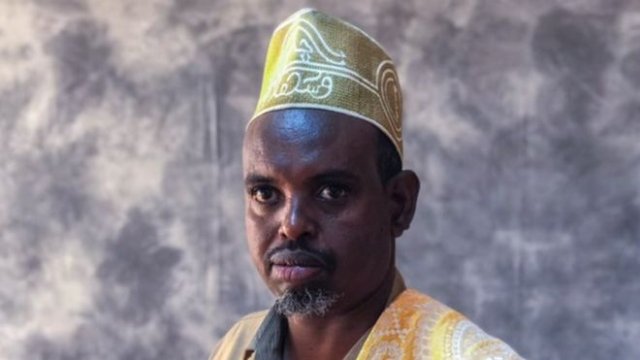A US jury has found that a former Uber driver living in Virginia committed acts of torture during Somalia’s civil war in the late 1980s.
Somali citizen Farhan Tani Warfaa testified last week in the Washington DC suburbs that ex-Somali colonel Yusuf Abdi Ali shot and tortured him.
Ali was a commander in the national army and supporter of dictator Mohamed Siad Barre, say court documents.
Until this month, Ali drove for Uber, with a high 4.89 rating.
On Tuesday, a jury at a federal court in Alexandria, Virginia, found that Ali was responsible for the torture of Mr Warfaa more than three decades ago, awarding Mr Warfaa $500,000 (£395,000) in damages.
Mr Warfaa, who first filed the case against Ali in 2004, told the BBC he was “very happy” with the verdict.
“I am very, very satisfied with the outcome,” Mr Warfaa said through a translator from court.
Mr Warfaa said he was kidnapped from his home in northern Somalia by a group of Ali’s soldiers in 1987.
Over the next several months, Mr Warfaa said he was interrogated, tortured, beaten and shot at the direction of Ali, who was a battalion commander.
Left for dead, Mr Warfaa says he only managed to survive by bribing his gravediggers to spare him.
Ali was first identified in a 1992 documentary by the Canadian Broadcasting Corporation, which detailed allegations that Ali had tortured, killed and maimed hundreds of people while working for the Barre regime.
At the time of the broadcast, Ali was living in Toronto working as a security guard.
In the documentary, multiple eyewitnesses in northern Somalia described brutal murders ordered by Ali, known then as Colonel Tukeh, meaning “the crow”.
Shortly after it aired, Ali was deported from Canada for “serious human rights abuses”, court documents say.
The US also began deportation proceedings against Ali, but he returned to the country in 1996. It is unclear how he was able to re-enter the US.
The Department of Homeland Security did not immediately respond to a request for comment.
In May, CNN reporters went undercover to take an Uber ride with Ali. He told CNN that he drives for rideshares Uber and Lyft full-time, preferring weekend shifts because “that’s where the money is”.
Asked if the application process for drivers was difficult, Ali replied that it was simple: “They just want your background check, that’s it.”
Ali drove for Uber for about 18 months, after passing a screening process for the rideshare company. The background check included a review of Ali’s criminal history using state and national records, and a scan of government watchlists from the FBI and Interpol.
He has now been “permanently removed” from the app, an Uber spokesperson told the BBC.
Lyft spokeswoman Campbell Matthews said the company was “horrified” by the allegations against Ali.
“We have permanently banned this driver from our community and stand ready to assist law enforcement with any investigation,” Ms Matthews said.
Background checks for both Uber and Lyft are conducted by Checkr, a consumer reporting agency.
Checkr’s scanning process varies according to client, but includes “industry standard sources” like the national Sex Offender database, FBI watchlist, Interpol watchlist, various US and international sanctions lists, and local and federal criminal court records.
“Under federal law, consumer reporting agencies that process background checks rely on criminal records that have been filed in a court of law rather than unverified sources like Google search results,” said a Checkr spokesperson to the BBC.
“Most employers don’t request background checks that include civil lawsuits between private parties because the information is too subjective to use for a hiring decision.”
Before working for Uber and Lyft, Ali worked as a security guard at Dulles International Airport near Washington DC.
Tuesday’s ruling, in favour of Mr Wafaa, demanded “heroic amounts of effort,” said his lawyer, Kathy Roberts.
Ms Roberts is part of the Center for Justice and Accountability (CJA), a San Francisco-based nonprofit organisation that seeks to bring alleged war criminals to justice.
Much of Mr Warfaa’s case, thwarted by delays for over a decade, hinged upon whether Ali could be found guilty by a US court of a crime committed in Somalia.
US laws, namely the Torture Victim Protections Act (TVPA), prohibit torture whether it occurs on US soil or overseas, and allows both US citizens and non-citizens to bring claims for torture and extrajudicial killings committed in foreign countries.
The TVPA only allows for the finding of civil claims in the US, meaning that lawsuits result in monetary compensation, rather than jail time.
When Ali moved to Virginia, he exposed himself to the lawsuit, said Benjamin Klein, another lawyer for Mr Wafaa.
Mr Warfaa’s case included testimony from a former US ambassador, soldiers who served under Ali, and another victim of the former colonel, as he argued that Ali had directed acts of torture and attempted an extrajudicial killing.
The US jury issued a split ruling, finding Ali only guilty of torture.
Still, Mr Warfaa is “absolutely thrilled”, said Mr Klein.
“He’s been waiting 31 years for this day.”
Source: BBC

